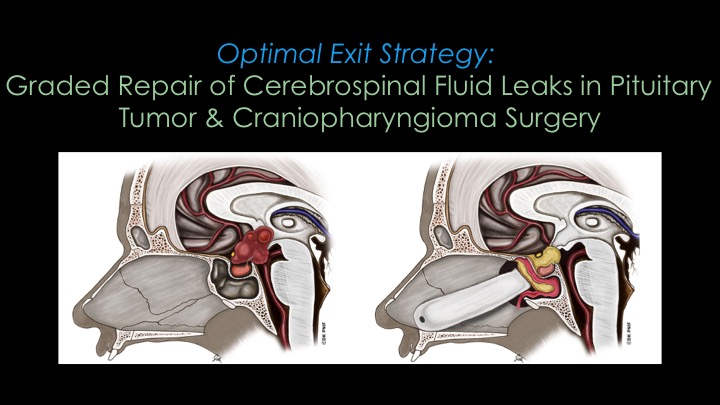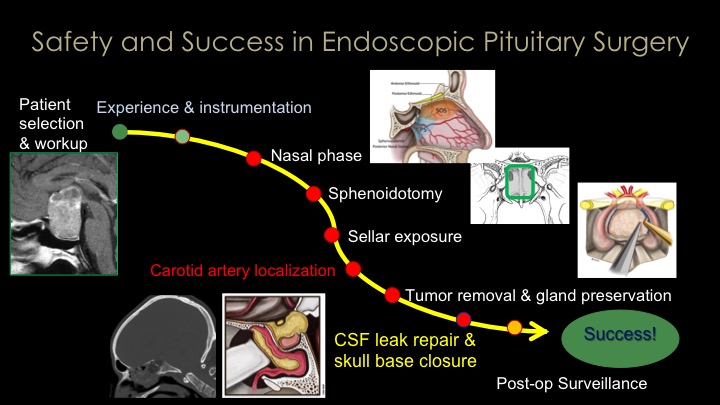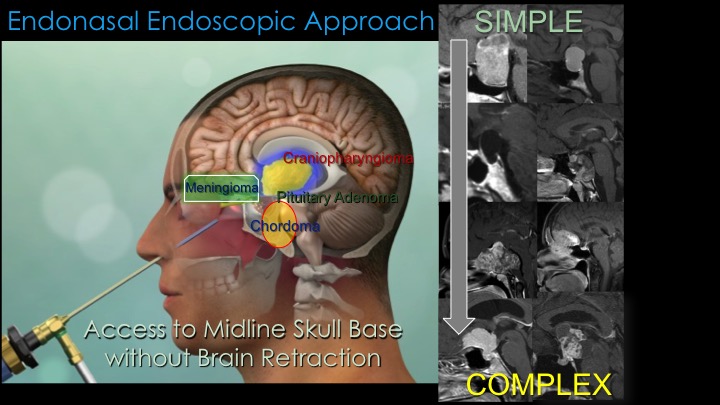



Keeping Cerebrospinal Fluid Leaks and Meningitis at Bay
by Daniel F. Kelly
Defining the Optimal Exit Strategy in Pituitary and Skull Base Tumor Surgery
PNI authors have published a landmark article1 in the latest issue of Journal of Neurosurgery. Leading the way in the field of minimally invasive brain surgery, PNI’s expert team reported on intraoperative repair of skull base defects and prevention of post-operative CSF leaks and meningitis in over 500 patients with pituitary tumors and skull base tumors.
Over the last decade, endoscopic endonasal surgery has gradually become the predominant method for removal of pituitary adenomas and related brain and skull base tumors. After tumor removal, an effective exit strategy is essential to avoid a postoperative cerebrospinal fluid leak (CSF) and meningitis (spinal fluid infection). Unfortunately, post-operative CSF leaks have been one of the most common complications after transsphenoidal and endoscopic pituitary surgery.
Creating a CSF Grading System
In 2007, we published a CSF leak grading system and repair protocol validated in a series of over 600 patients treated by an endoscopic endonasal approach. That report stressed a graded approach to skull base repair based on the size of the leak (grade 0, 1, 2, or 3) with more extensive repair methods needed for larger leaks.
This current report updates our use of a graded approach to skull base repair and CSF leak prevention following with the purely endoscopic approach in a series of over 500 consecutive patients.
The essential premise of the original paper has remained, namely that:
- Smaller leaks can generally be repaired in a more minimalist fashion while larger defects require maximal and multiple measures, and
- The majority of CSF leak repairs warrant use of a permanent or temporary buttress placed within the skull base region or at least a temporary soft buttress to hold the repair in position.
It follows our 2007 widely cited paper on the same topic2, which stresses the importance of complication avoidance as part of essential surgical strategy for complex neurosurgical conditions.
Systematic Protocols for Lower CSF Leak Occurrence
Medical literature indicates that the rates of post-operative leaks in recent large series of endoscopic surgery published over the last decade have ranged from 3-16% and meningitis rates have ranged from 1-10%.
In this reported current series from our center spanning a 7-year period from 2010-2017, the overall repair failure rate was 1.6% and meningitis rate was 1.1%, and in the 2nd half of the series, the repair failure and meningitis rates fell even lower to 1% and 0.7% respectively. These repair failure rates and meningitis rates are the lowest rates in the literature published to date.
Reference:
- Evolution of the graded repair of CSF leaks and skull base defects in endoscopic endonasal tumor surgery: trends in repair failure and meningitis rates in 509 patients
Andrew Conger, MD, Fan Zhao, MD, PhD, Xiaowen Wang, MD, Amalia Eisenberg, NP, Chester Griffiths, MD, Felice Esposito, MD, PhD, Ricardo L. Carrau, MD, Garni Barkhoudarian, MD, and Daniel F. Kelly, MD
Published in Journal of Neurosurgery 2018 - Graded repair of cranial base defects and cerebrospinal fluid leaks in transsphenoidal surgery
Felice Esposito,MD, Joshua R. Dusick, MD, and Daniel F. Kelly, MD
Published in Journal of Neurosurgery 2007

Daniel F. Kelly, MD, is the Director of the Pacific Neuroscience Institute in Santa Monica, CA. Considered to be one of the top neurosurgeons in the US, Dr. Kelly is internationally recognized in the field of minimally invasive keyhole surgery for brain, pituitary and skull base tumors. He continues to focus his efforts on advancing innovative treatments for patients, providing fellowship training in minimally invasive neurosurgery, and patient education and support.
About the Author

Daniel F. Kelly
Daniel F. Kelly, MD, is the Director of the Pacific Brain Tumor and Pituitary Disorders Centers at Providence Saint John’s Health Center in Santa Monica, CA. Considered to be one of the top neurosurgeons in the U.S., Dr. Kelly is internationally recognized in the field of minimally invasive keyhole surgery for brain, pituitary and skull base tumors. He continues to focus his efforts on advancing innovative treatments for patients, providing fellowship training in minimally invasive neurosurgery, and patient education and support.
Last updated: January 14th, 2019